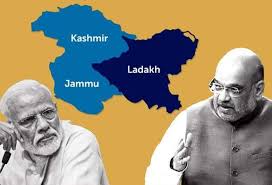Abrogation of Article 370 is a national issue and not a political one

The Vice President of India, Shri M. Venkaiah Naidu has asserted that abrogation of Article 370 is a national issue and not a political one and called upon people to speak in one voice. He cautioned that a neighbouring country could misuse fragmented opinions at international fora.
Daily Current Affairs Quiz 2019
Speaking at a ‘Meet and Greet’ organized by the Vice President’s friends and well-wishers on the completion of two years in office at Vijayawada, Andhra Pradesh today, Shri Naidu said that abrogation of Article 370 was long overdue as it concerned the unity and integrity of the country.
Asserting that Article 370 was only a temporary and transitory provision in the constitution, the Vice President said that its dilution would lead to industrialization of Jammu and Kashmir, create employment and promote tourism.
Pointing out that the Bill on reorganization of Jammu and Kashmir was passed by 2/3rds majority in the Rajya Sabha and 4/5ths in the Lok Sabha, the Vice President recalled the debate which took place in 1964 on a private member’s bill when members cutting across the party lines called for its abrogation.
The Vice President quoted a news report published by a national daily in 1964 and said that the non official resolution moved by Shri Prakash Vir Shastri in Lok Sabha was supported by several members of Congress including Bhagavat Jha Azad, Sarjoo Pandey (CPI), K Hamunathaiah, H V Kamath ( Socialist) and also members from Jammu & Kashmir state.
The Vice President also said that former Prime Minister, Jawaharlal Nehru had pointed to the transitory and temporary nature of the provision in the Constitution during a debate in Parliament in 1963.
Observing that India as the largest Parliamentary democracy, should also become an ideal and vibrant Parliamentary democracy, Shri Naidu stressed the need to bring in reforms in legislature, executive and Judiciary for improving efficiency in delivery of public services and to ensure that the fruits of development reach every section of the society.
At the same time, the Vice President called upon all the political parties to evolve a code of conduct for their public representatives at various levels including in Parliament and state Assemblies. He also wanted parties to improve the standards of public discourse and avoid cheap personal tirades and treat each other as rivals and not as enemies.
Shri Naidu advocated the constitution of special judicial tribunals for quick and time-bound disposal of criminal cases against politicians, election petitions and political defections. He said cases in all these categories must be disposed within a reasonable time frame of six months to one year.
The Vice President also called for plugging the loopholes in the 10th Schedule of the Constitution that deals with defections. He stressed the need for the presiding officers to take action on defection cases in a stipulated time of three months.
Shri Naidu also advocated setting up of Courts of Appeal and Supreme Court Benches in various parts of the country for speedy disposal of various cases.
Backing the call given by the Prime Minister Shri Narendra Modi to end usage of single use plastic by October 2nd this year, the Vice President said that other programs such as Swachh Bharat, Beti Padhao, Beti Bachao and Per Drop – More Crop should be converted into mass national movements with the active participation of people.
What is Article 370?
Article 370 is the Indian constitution gave special status to Jammu and Kashmir which has been the subject of dispute between India, Pakistan, and China since 1947.
The provision was drafted in 1947 by Sheikh Abdullah, who had by then been appointed prime minister of Jammu & Kashmir by Maharaja Hari Singh and Jawahar Lal Nehru. Sheikh Abdullah had argued that Article 370 should not be placed under temporary provisions of the Constitution. He wanted ‘iron clad autonomy’ for the state, which Centre didn’t comply with.
According to this article, except for defence, foreign affairs, finance and communications, Parliament needs the state government’s concurrence for applying all other laws. Thus the state’s residents live under a separate set of laws, including those related to citizenship, ownership of property, and fundamental rights, as compared to other Indians. As a result of this provision, Indian citizens from other states cannot purchase land or property in Jammu & Kashmir. Under Article 370, the Centre has no power to declare financial emergency under Article 360 in the state. It can declare emergency in the state only in case of war or external aggression. The Union government can therefore not declare emergency on grounds of internal disturbance or imminent danger unless it is made at the request or with the concurrence of the state government.
Article 370 revoked: Overview of Political parties
Home Minister Amit Shah’s announcement in Rajya Sabha to repeal Article 370, which granted special status to Jammu and Kashmir, was unsurprisingly met with jubilation among BJP leaders, and its rank and file alike.
Supporters:
1. Bahujan Samaj Party
2. Aam Aadmi Party
3. YSR Congress
4. Biju Janata Dal
5. Telegu Desam Party
6. AIADMK
7. Shiv Sena
Opponents:
1. Congress
2. People’s Democratic Party
3. National Conference
4. Janata Dal (United)
5. DMK
6. Rashtriya Janata Dal
7. Left
8. Trinamool Congress
9. Nationalist Congress Party